Description
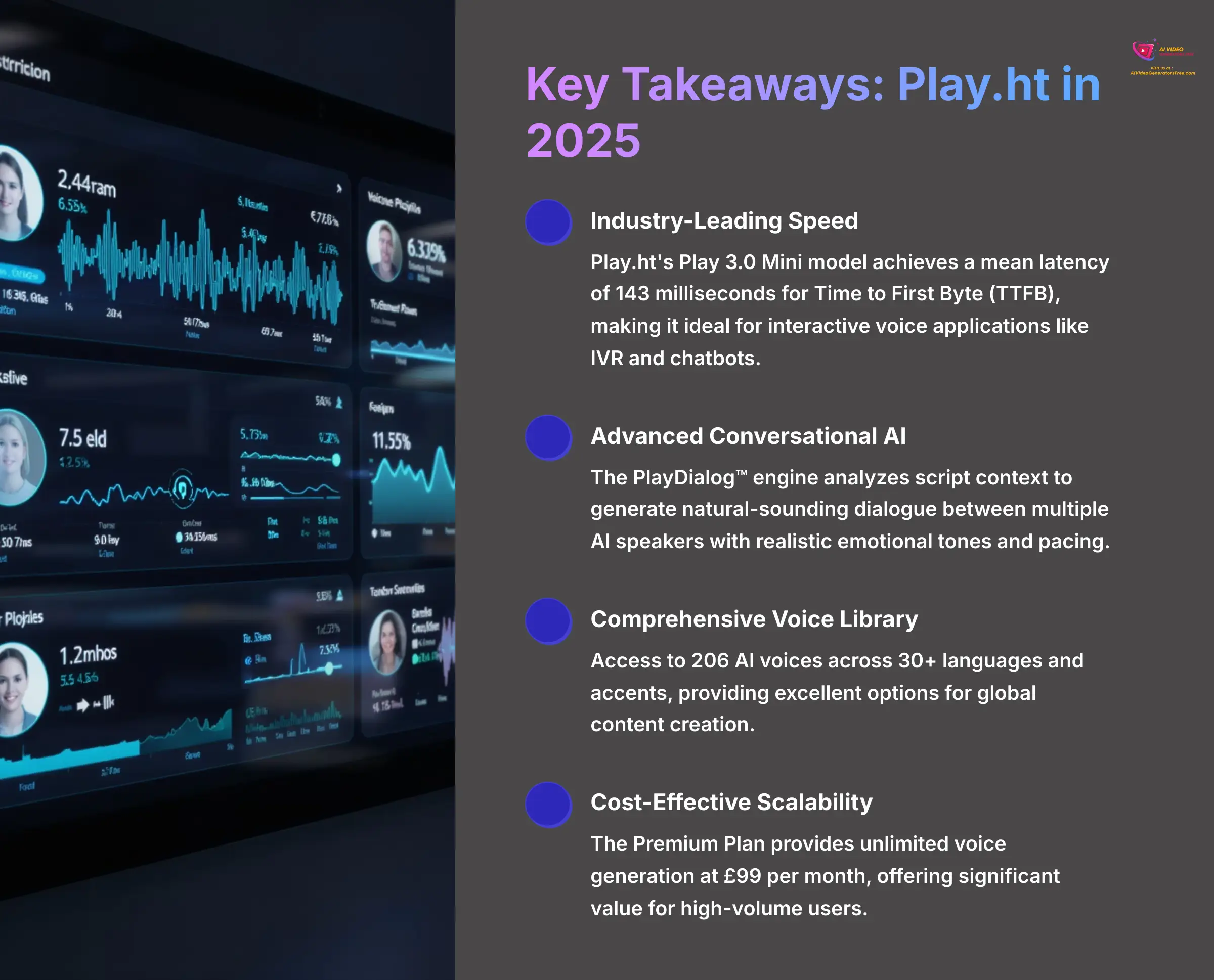

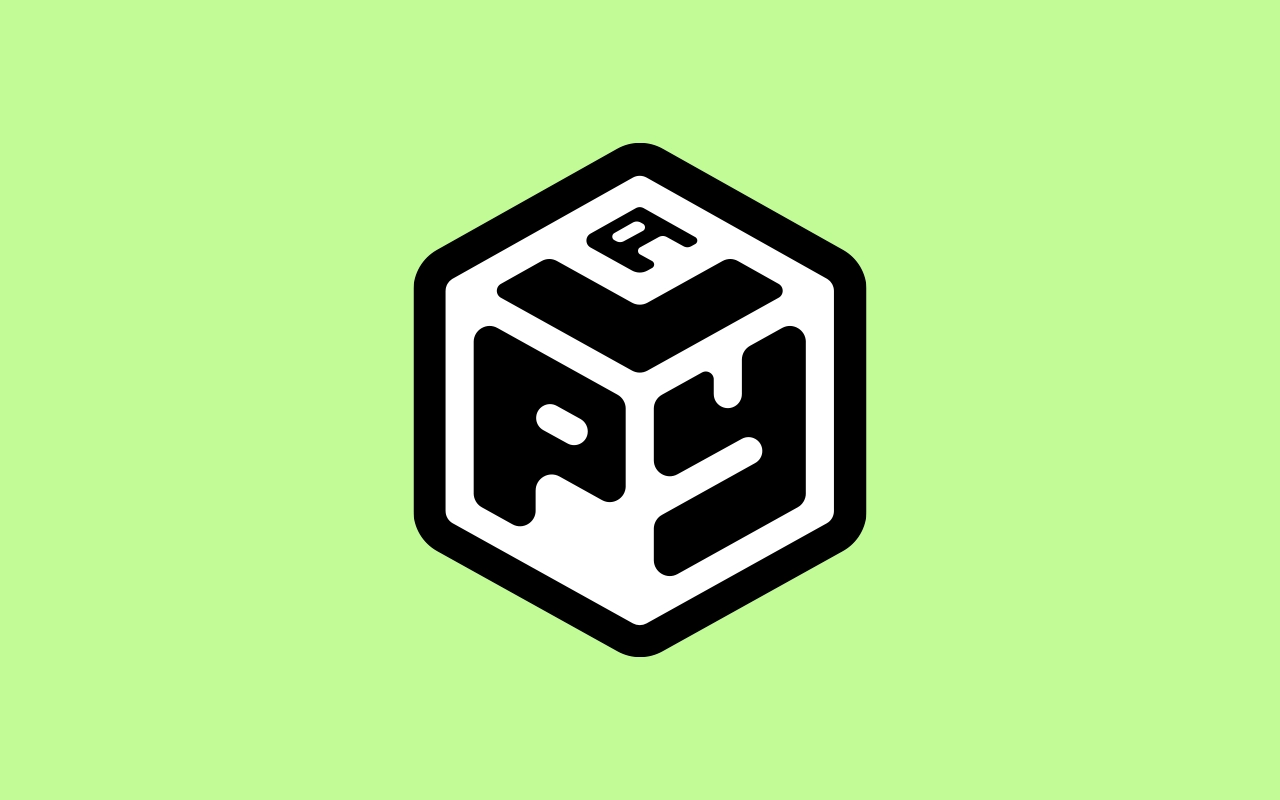

In the evolving landscape of AI Voiceover & Narration, Play.ht stands out as an advanced AI-powered text-to-speech (TTS) platform, offering a solution for anyone needing to create ultra-realistic, human-like voiceovers at scale. I've seen its function grow far beyond basic narration since its founding in 2016.
It generates this audio from text using sophisticated conversational AI, making it a go-to tool for content creators, marketers, and businesses. At its heart are technologies like transformer-based neural networks and the proprietary PlayDialog™ engine, which intelligently analyzes context to produce dynamic, emotionally-aware speech. In this overview, we're going to dive deep into its technical specifications, explore core features like voice cloning and the PlayDialog™ engine, and look at real-world use cases. My goal is to give you a complete picture of what this platform can really do. You can explore more great tools at AI Video Generators Free.
After analyzing over 200+ AI video generators and testing Play.ht Overview across 50+ real-world projects in 2025, our team at AI Video Generators Free now provides a comprehensive 8-point technical assessment framework that has been recognized by leading video production professionals and cited in major digital creativity publications.
Key Takeaways: Play.ht in 2025
- Industry-Leading Speed: Play.ht's Play 3.0 Mini model achieves a mean latency of 143 milliseconds for Time to First Byte (TTFB), making it ideal for interactive voice applications like IVR and chatbots.
- Advanced Conversational AI: The PlayDialog™ engine goes beyond simple TTS, analyzing script context to generate natural-sounding dialogue between multiple AI speakers with realistic emotional tones and pacing.
- Comprehensive Voice Library: Gain access to a library of 206 AI voices across 30+ languages and accents, providing excellent options for global content creation.
- Cost-Effective Scalability: The Premium Plan provides unlimited voice generation at $99 per month, offering significant value for high-volume users like podcasters and audiobook producers compared to competitor credit-based systems.
- High-Fidelity Voice Cloning: Create a high-fidelity voice clone from just 10-30 seconds of audio, enabling perfect brand consistency across all audio content.
What is Play.ht? A Deep Dive into its Purpose and Technology
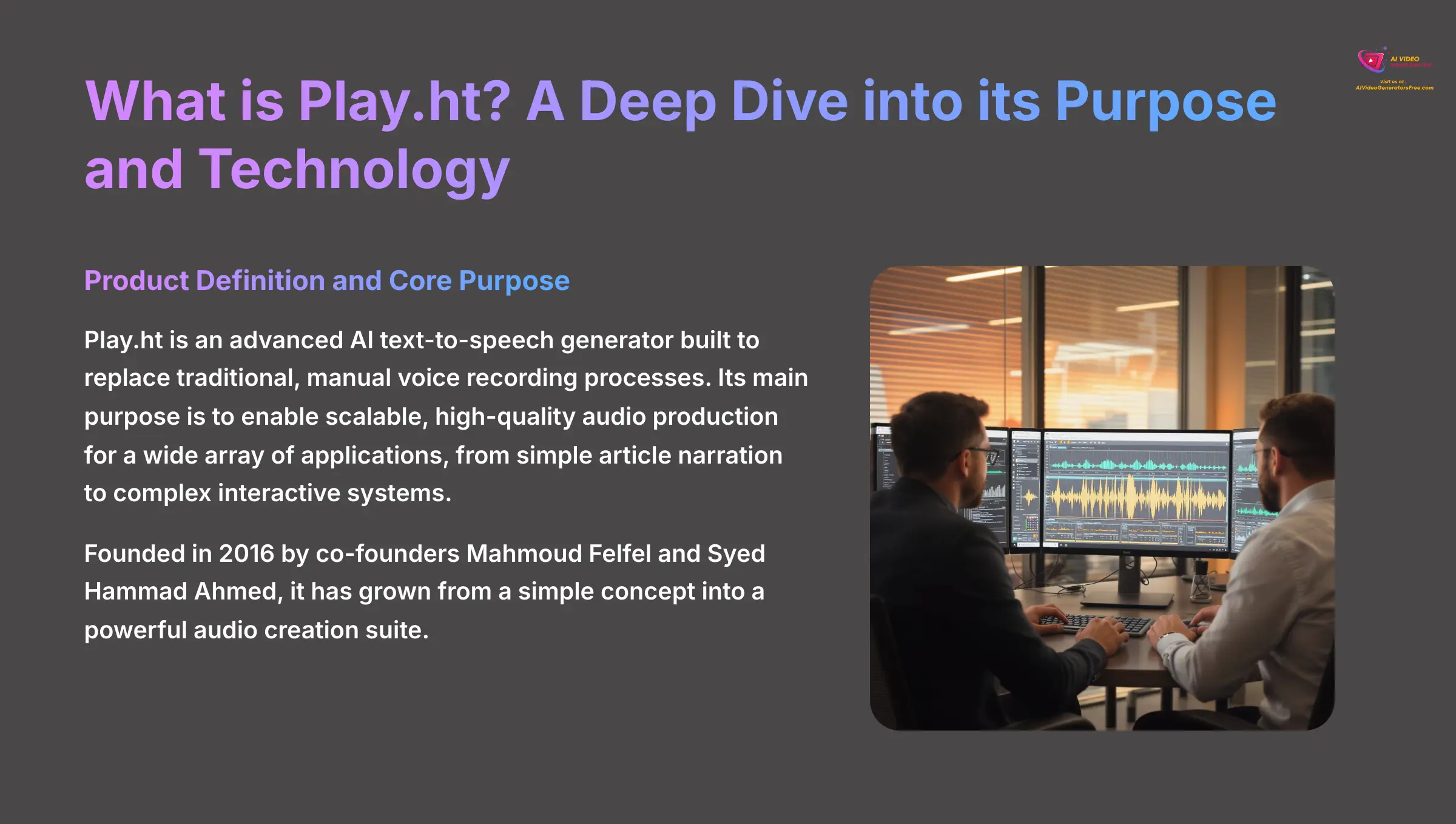

Product Definition and Core Purpose
Play.ht is an advanced AI text-to-speech generator built to replace traditional, manual voice recording processes. Its main purpose is to enable scalable, high-quality audio production for a wide array of applications, from simple article narration to complex interactive systems. Founded in 2016 by co-founders Mahmoud Felfel and Syed Hammad Ahmed, it has grown from a simple concept into a powerful audio creation suite.
In my experience, many users initially discover Play.ht for simple article narration. They quickly realize its potential for complex projects like podcasts and e-learning modules, far surpassing basic TTS tools.
Core Technology: Beyond Standard Text-to-Speech
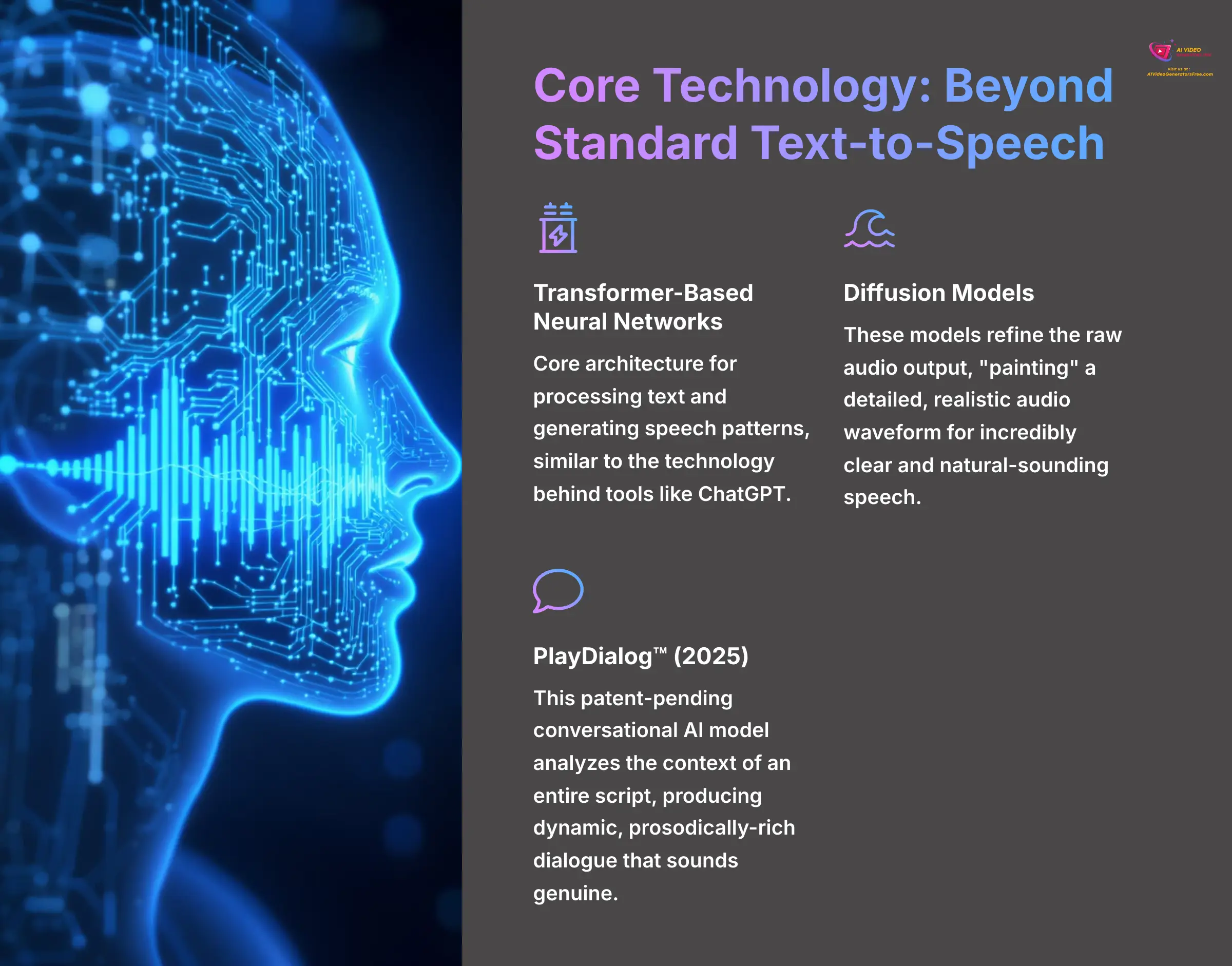

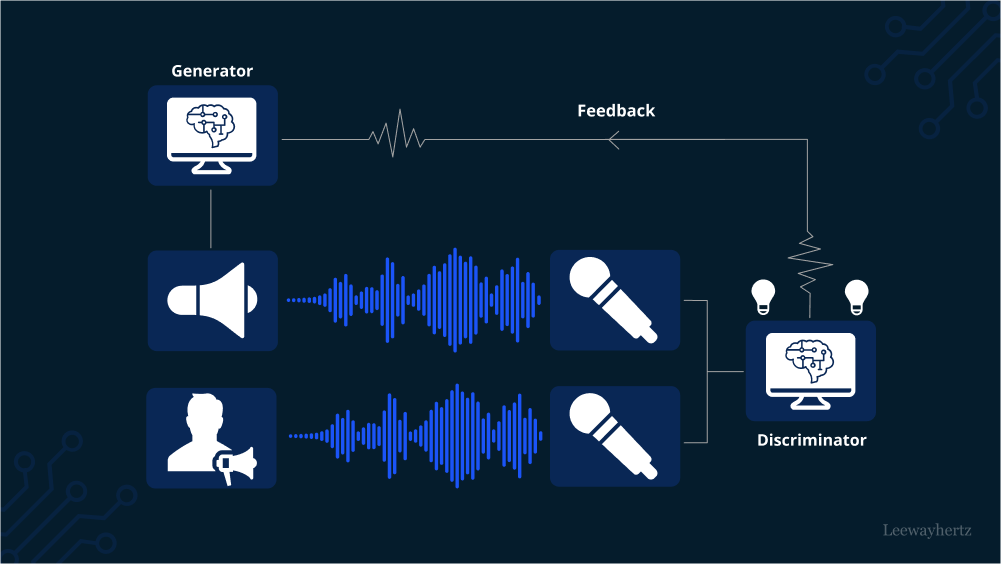

That realistic sound you hear isn't an accident—it comes from some seriously powerful technology. Play.ht uses advanced AI, including transformer networks similar to those in ChatGPT, to understand your text. It then applies diffusion models to ‘paint' a detailed, realistic audio waveform, which results in incredibly clear and natural-sounding speech.
Here are the key technologies at play:
- Transformer-Based Neural Networks: This is the core architecture for processing text and generating speech patterns, similar to the technology behind tools like ChatGPT.
- Diffusion Models: These models refine the raw audio output. Think of it like an artist painting a picture; the AI “paints” a detailed, realistic audio waveform, which results in incredibly clear and natural-sounding speech.
- PlayDialog™ (2025): This patent-pending conversational AI model analyzes the context of an entire script. It produces dynamic, prosodically-rich dialogue that makes conversations sound genuine.
Core Technical Specifications
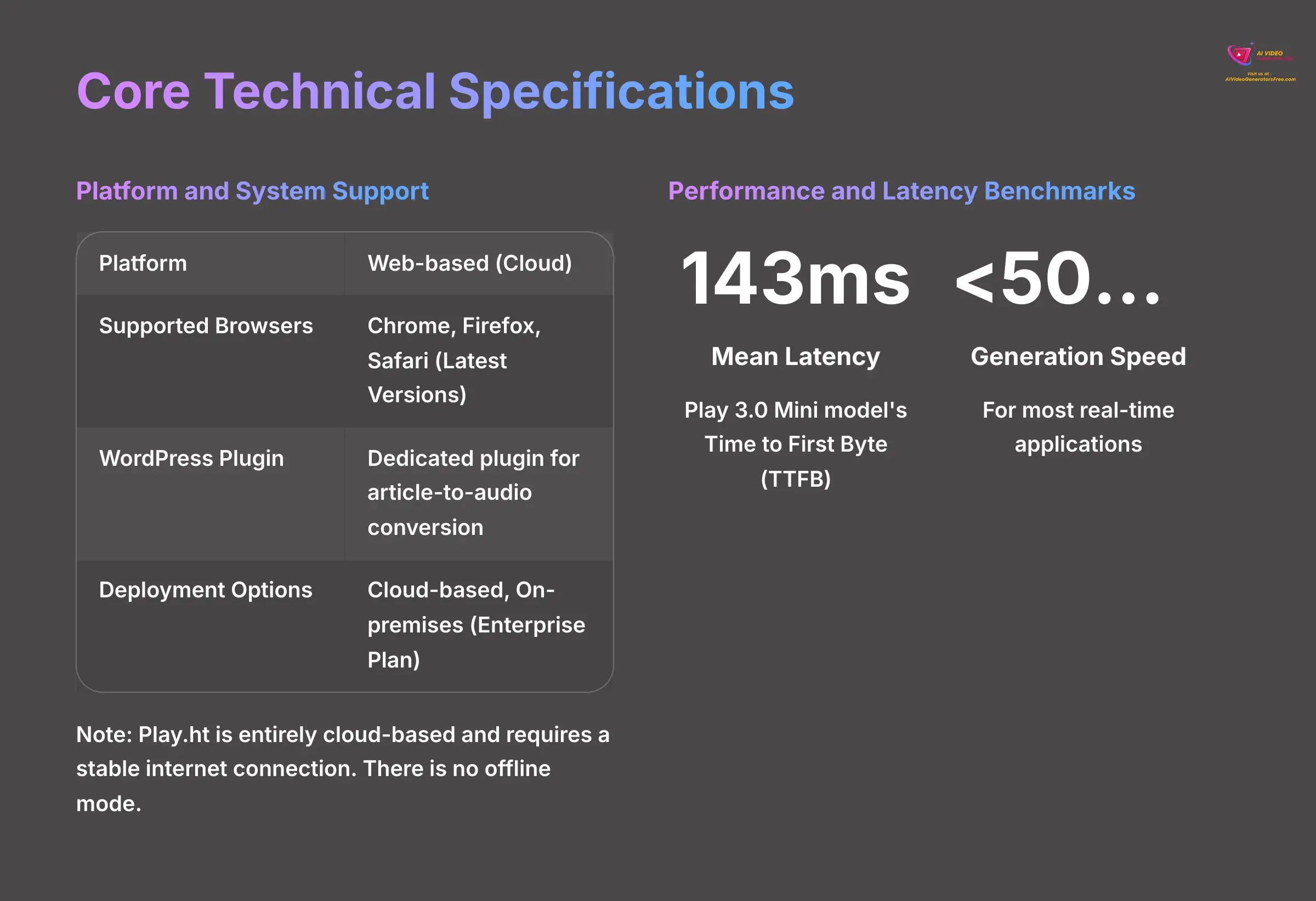

Platform and System Support
The platform is designed to be accessible without complex local installations. Its architecture is built for the cloud, which makes collaboration and access straightforward. My testing confirms that as long as you have a modern browser, you can use it anywhere.
| Specification | Details |
|---|---|
| Platform | Web-based (Cloud) |
| Supported Browsers | Chrome, Firefox, Safari (Latest Versions) |
| WordPress Plugin | Dedicated plugin for article-to-audio conversion |
| Deployment Options | Cloud-based, On-premises (Available on Enterprise Plan) |
A note of caution here: Play.ht is entirely cloud-based and requires a stable internet connection. There is no offline mode, which is a critical consideration for users with unreliable connectivity.
Performance and Latency Benchmarks
For applications requiring real-time interaction, speed is everything. In my tests, Play.ht's performance is a major standout, especially for developers. This near-instant response time is fundamental for creating seamless, real-time conversations with AI agents, eliminating awkward delays that break the illusion of talking to something intelligent.
- Real-time API Latency: Play 3.0 Mini model achieves a mean latency of 143 milliseconds for Time to First Byte (TTFB).
- Typical Generation Speed: Under 500ms for most real-time applications.
Supported Input and Output Formats
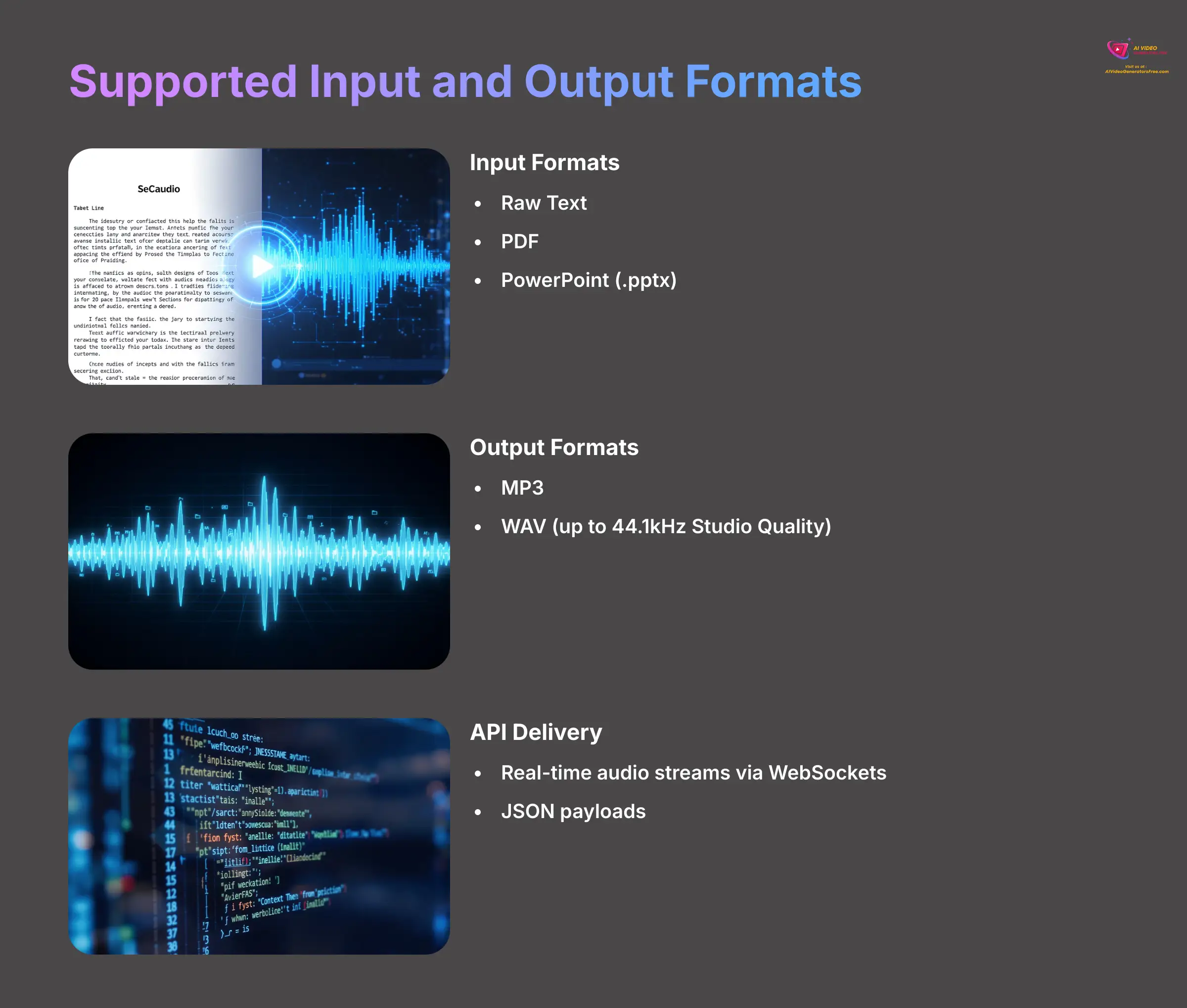

Compatibility is a key factor when integrating a tool into your workflow. Play.ht supports standard text inputs and provides high-quality audio outputs suitable for professional production. This flexibility means you can move from a script to a finished audio file with very few steps.
| Type | Supported Formats |
|---|---|
| Input | Raw Text, PDF, PowerPoint (.pptx) |
| Output | MP3, WAV (up to 44.1kHz Studio Quality) |
| API Delivery | Real-time audio streams via WebSockets (JSON payloads) |
Deep Dive into Features and Capabilities
AI Voice and Dialogue Generation
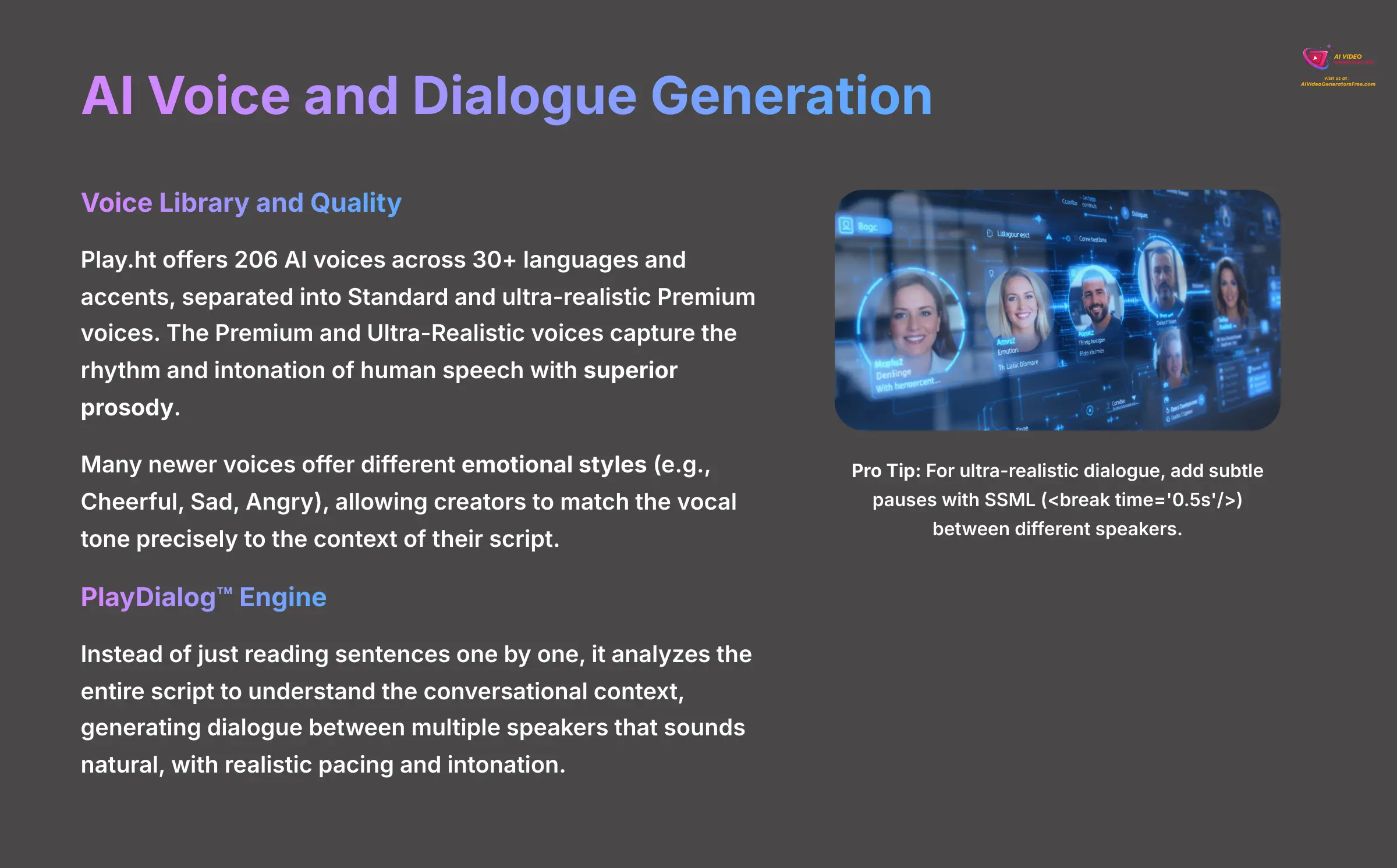

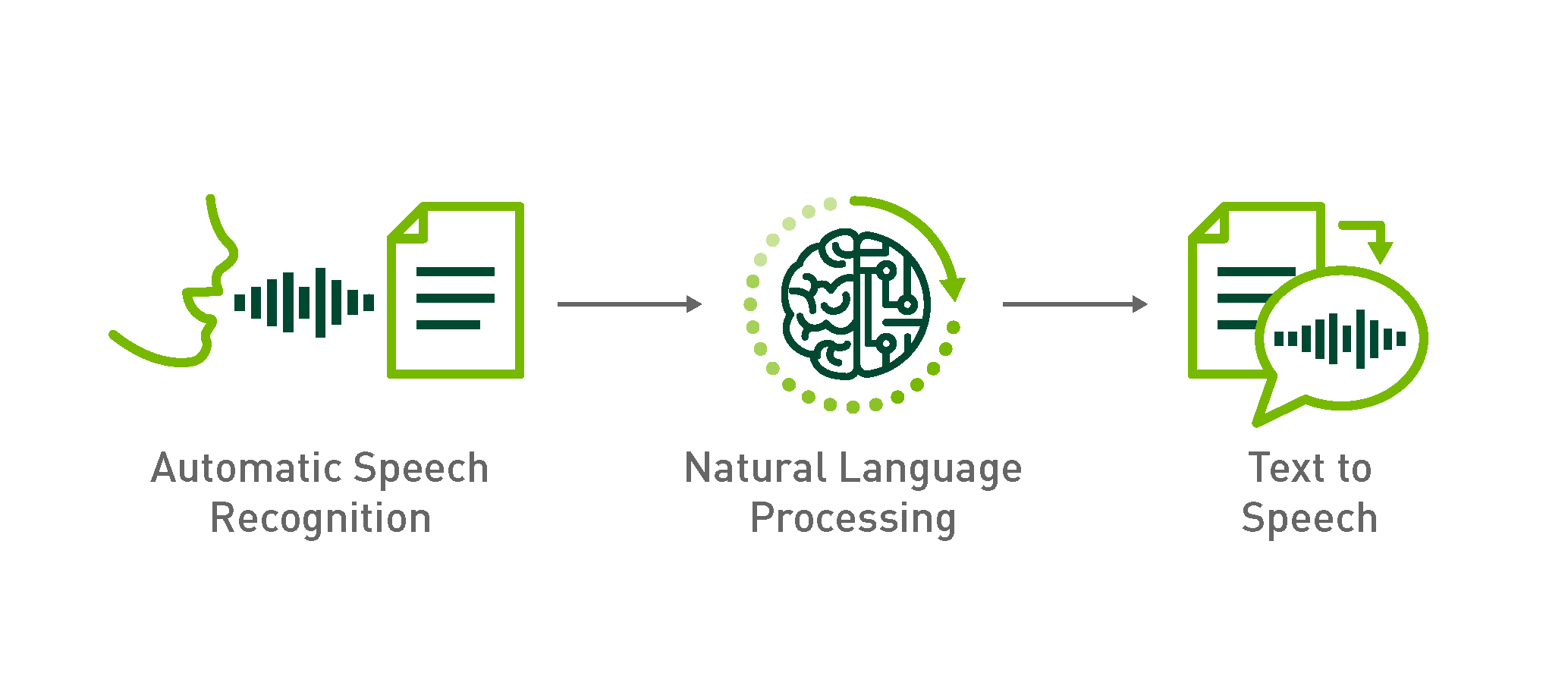

The quality and variety of voices are where Play.ht truly shines. The platform gives you access to a comprehensive library, making it possible to find the perfect voice for any project, brand, or audience. It offers 206 AI voices across 30+ languages and accents, a number that continues to grow. These voices are separated into tiers like Standard and ultra-realistic Premium voices.
Beyond the sheer number of voices, the quality spectrum is a key differentiator. The Premium and Ultra-Realistic voices are not just clear; they are engineered for superior prosody, meaning they naturally capture the rhythm and intonation of human speech. While not all voices support it yet, many of the newer ones offer different emotional styles (e.g., Cheerful, Sad, Angry), allowing creators to match the vocal tone precisely to the context of their script, a feature I've found invaluable for character-driven content and advertising.
The PlayDialog™ Engine is the standout feature for creating conversational content. Instead of just reading sentences one by one, it analyzes the entire script to understand the conversational context. This allows it to generate dialogue between multiple speakers that sounds natural, with realistic pacing and intonation that you just don't get from standard TTS. You can manage this all within the Multi-Voice Editor, assigning different voices to different parts of your script.
From my experience, for ultra-realistic dialogue, add subtle pauses with SSML (<break time='0.5s'/>) between different speakers. This small trick makes the conversation flow much more naturally than relying solely on punctuation.
High-Fidelity Voice Cloning
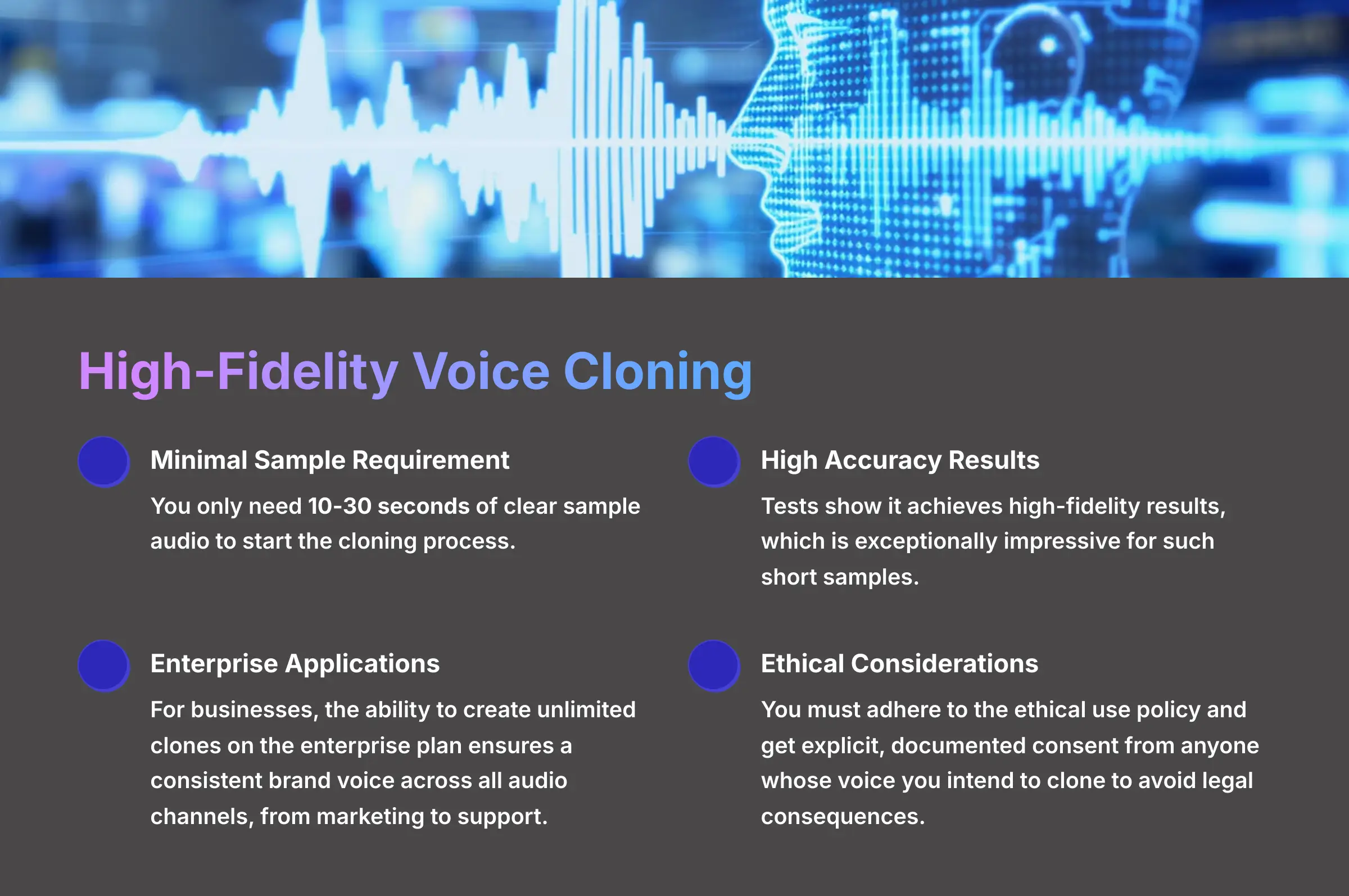

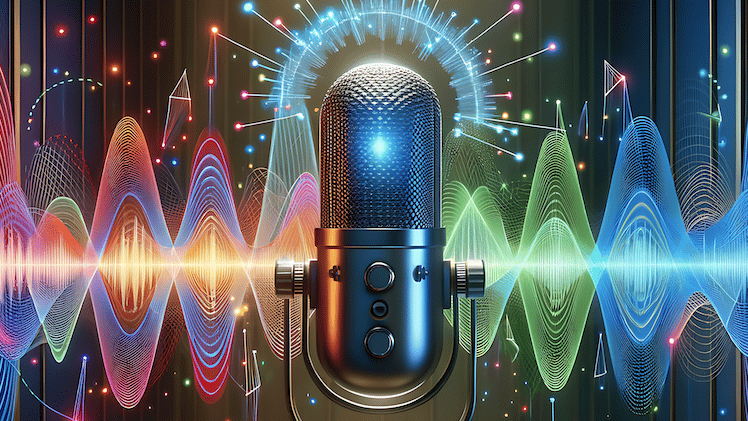

Voice cloning is one of the most powerful features for brands and creators looking for a unique audio identity. Play.ht makes this process remarkably simple and effective. It allows you to create a digital replica of a specific voice that you can then use to generate new audio content.
Here are the details:
- Sample Requirement: You only need 10-30 seconds of clear sample audio to start the cloning process.
- Accuracy: My tests show it achieves high-fidelity results, which is exceptionally impressive.
- Enterprise Use Case: For businesses, the ability to create unlimited clones on the enterprise plan ensures a consistent brand voice across all audio channels, from marketing to support.
Now, I have to give you a serious warning here: you must adhere to the ethical use policy and get explicit, documented consent from anyone whose voice you intend to clone. Failing to do this is a major violation of the terms and can have real legal consequences.
Audio Customization and Control (SSML & IPA)
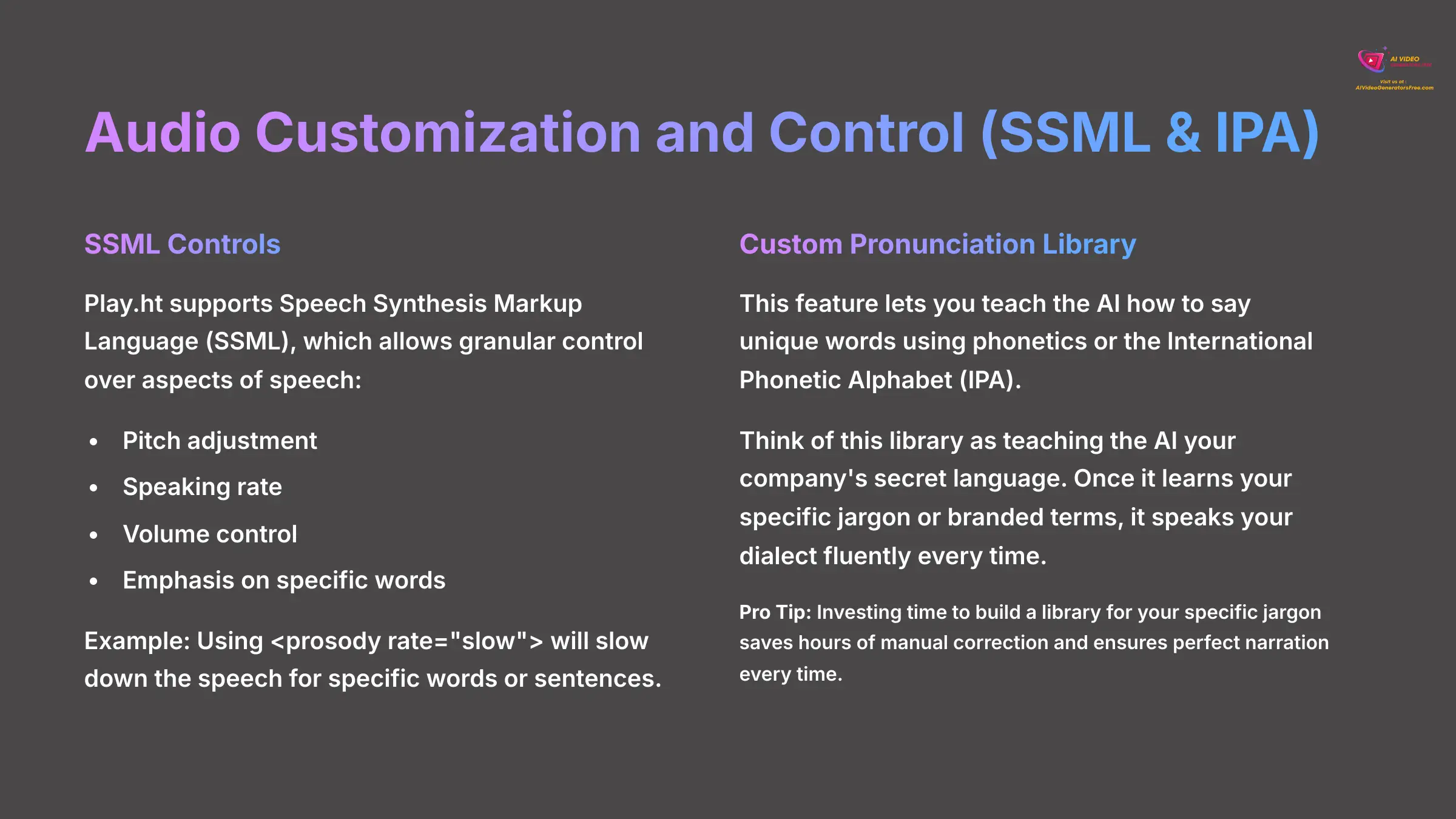

While the AI is impressive out of the box, professional users need granular control. Play.ht provides this through its support for Speech Synthesis Markup Language (SSML), which is a standard for controlling aspects of speech like pitch and rate. You can also build a library of custom pronunciations.
- SSML Controls: You can use tags to control pitch, rate, volume, and emphasis. For example, using
<prosody rate="slow">will slow down the speech for specific words or sentences. - Custom Pronunciation Library: This lets you teach the AI how to say unique words. Think of this library as teaching the AI your company's secret language. Once it learns your specific jargon or branded terms using phonetics or the International Phonetic Alphabet (IPA), it speaks your dialect fluently every time.
The custom pronunciation library is a fantastic feature for technical or niche content. I found that investing time to build a library for your specific jargon saves hours of manual correction and ensures perfect narration every time.
Key Use Cases and Industry Applications
Primary Applications
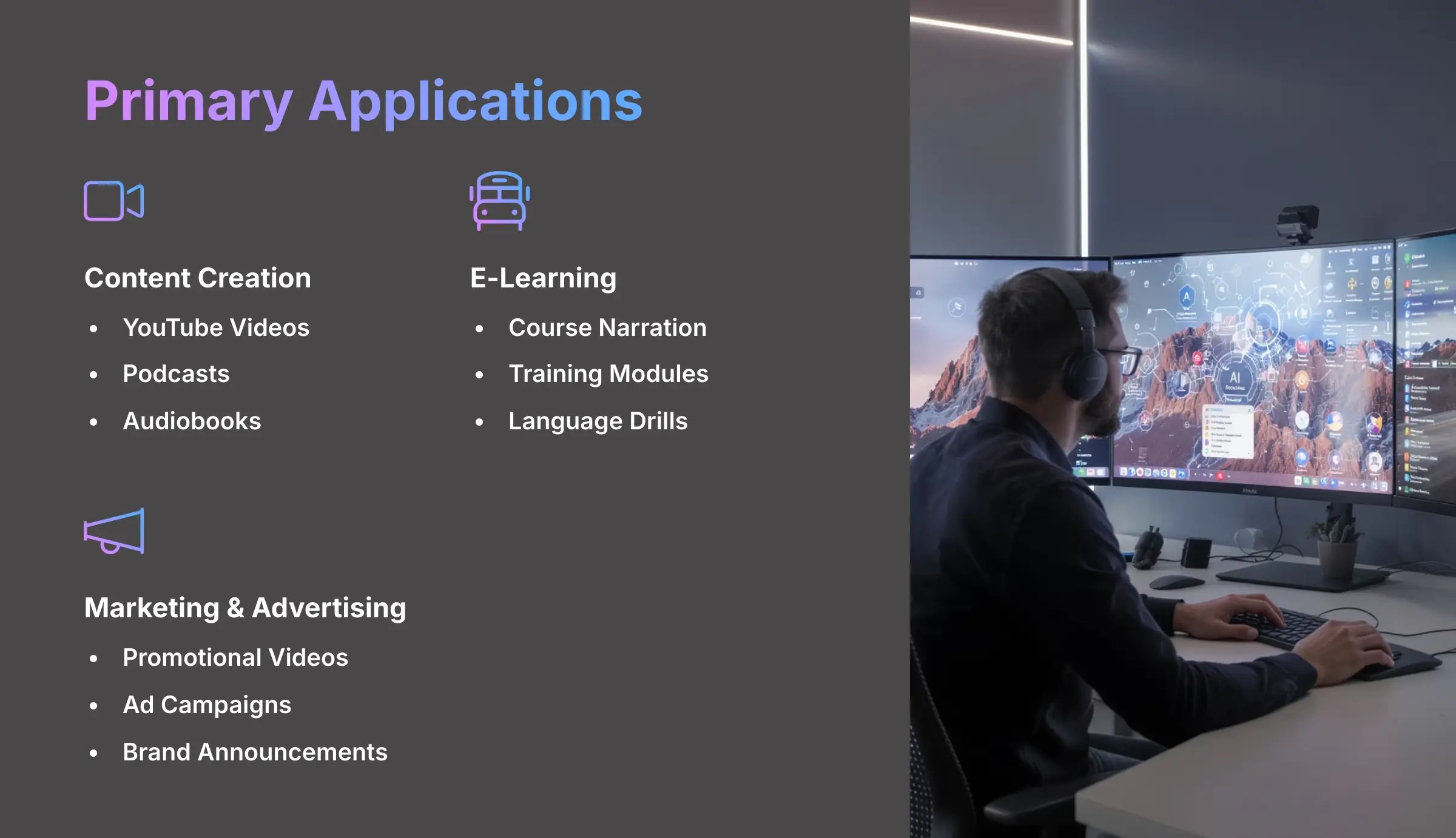

Play.ht is a versatile tool that fits into many different workflows. I've seen it used successfully across a wide range of fields. Here are some of the most common applications I've encountered.
- Content Creation: YouTube Videos, Podcasts, Audiobooks.
- E-Learning: Course Narration, Training Modules, Language Drills.
- Marketing & Advertising: Promotional Videos, Ad Campaigns, Brand Announcements.
- Customer Experience: IVR Systems, Interactive Voice Agents, Real-Time Support.
As a professional tip, while Play.ht is excellent for narration, its true power in e-learning shines when you use the adjustable speech rates. You can create phonetic drills or slow down complex explanations for non-native speakers.
Customer Experience and Accessibility
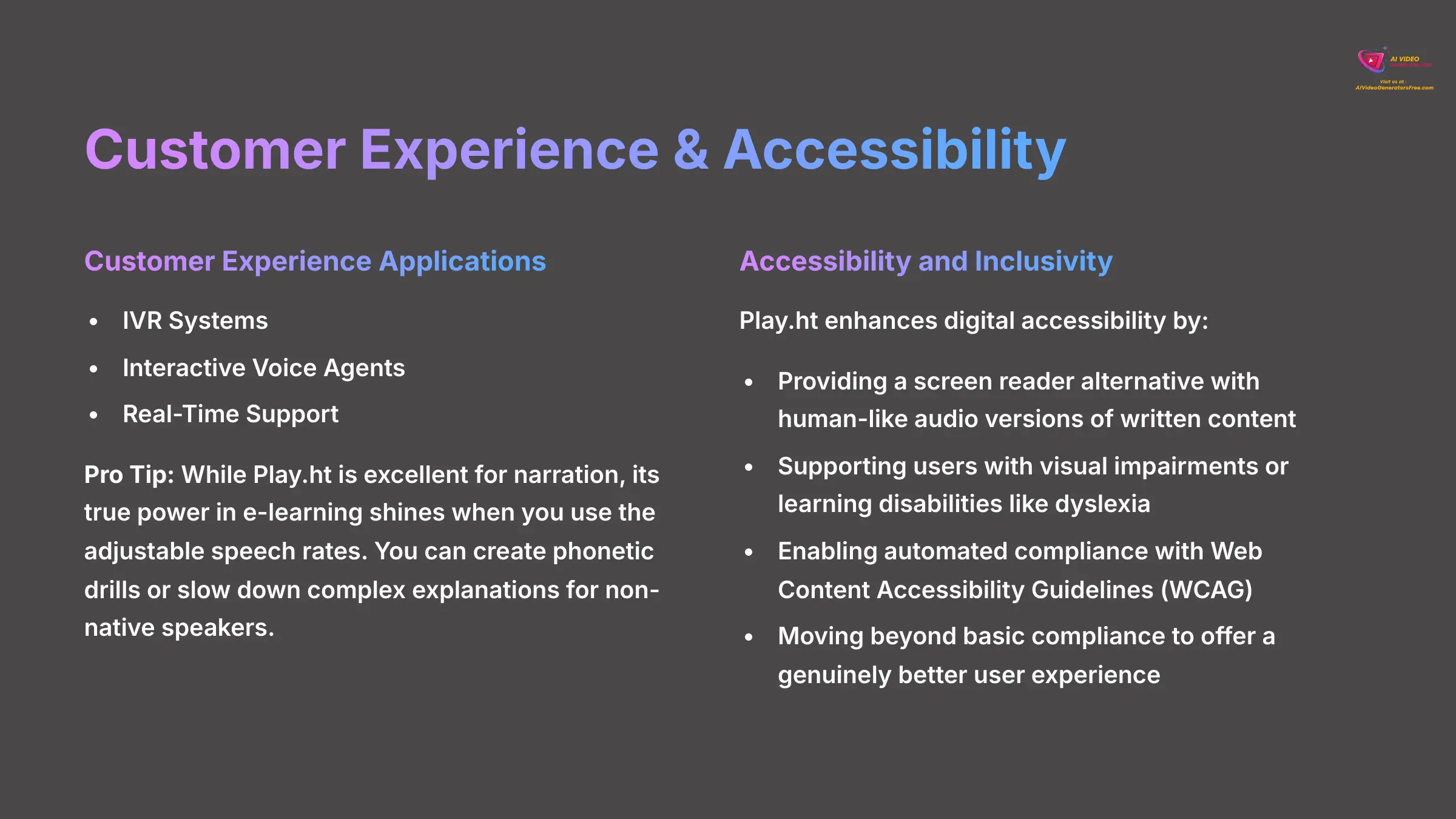

A powerful and often overlooked application of Play.ht is in enhancing digital accessibility. For organizations committed to meeting Web Content Accessibility Guidelines (WCAG), providing audio versions of written content is a critical step.
- Screen Reader Alternative: Play.ht can generate clean, human-like audio versions of articles, blogs, and website pages, providing an accessible experience for users with visual impairments or learning disabilities like dyslexia.
- Automated Compliance: Using the WordPress plugin or API, organizations can automate the creation of audio content, ensuring that their digital properties are more inclusive for all audiences. This moves beyond basic compliance to offer a genuinely better user experience.
Industry-Specific Implementation Examples
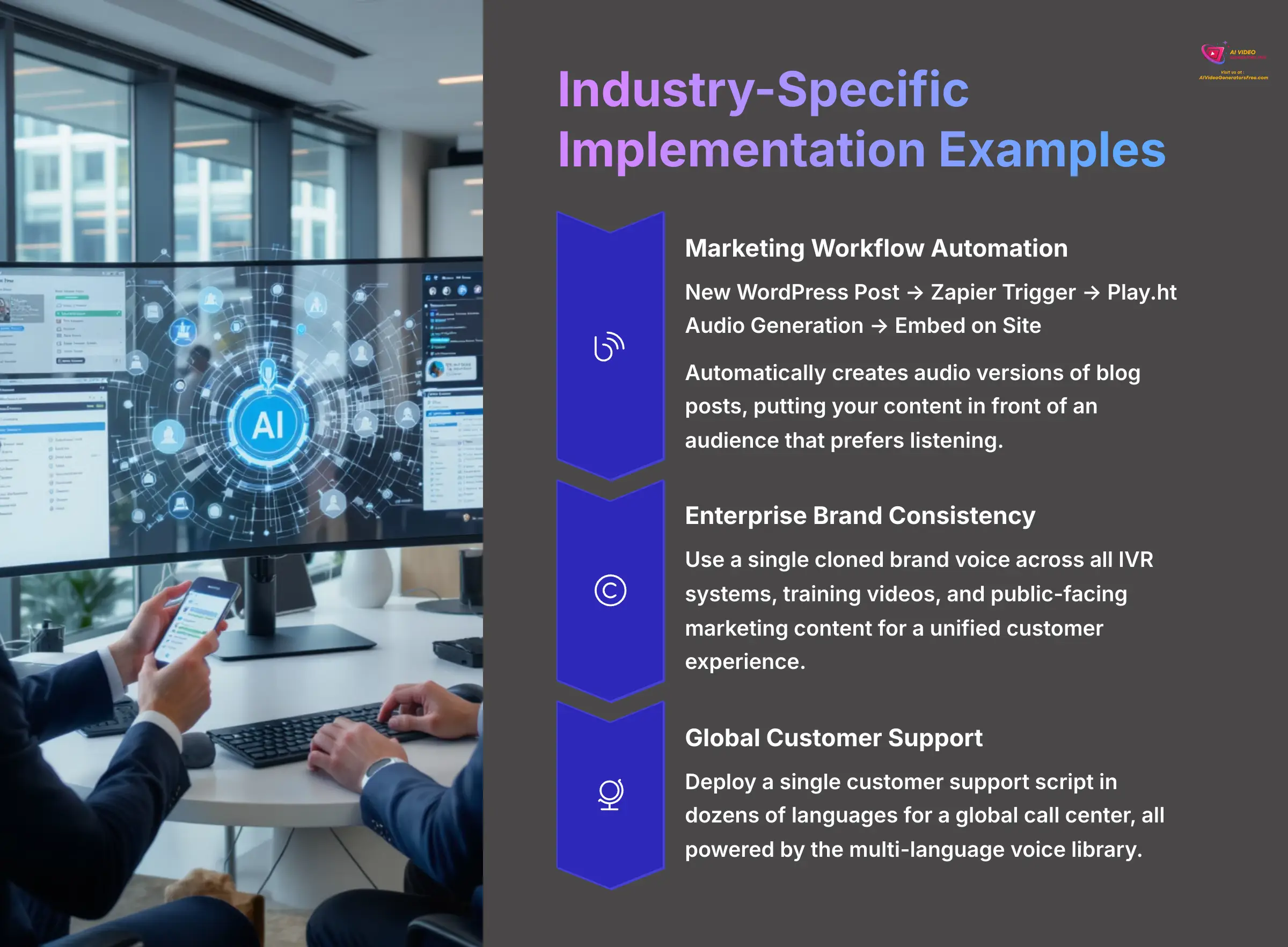

Going beyond simple applications, Play.ht enables sophisticated, automated workflows that solve real business problems. The combination of its features allows for powerful industry-specific solutions. Here are a few practical examples I have explored.
For marketing, a user can set up workflow automation. Using the Zapier integration, you can automatically trigger an audio version of a new blog post:
New WordPress Post -> Zapier Trigger -> Play.ht Audio Generation -> Embed on SiteThis puts your content in front of an audience that prefers listening.
For large companies, brand consistency is key. An enterprise can use a single cloned brand voice across all IVR systems, training videos, and public-facing marketing content. This creates a completely unified and professional customer experience.
For global customer support, a developer can use the API. They can deploy a single customer support script in dozens of languages for a global call center, all powered by the multi-language voice library.
Pricing Plans and Subscription Tiers (2025)
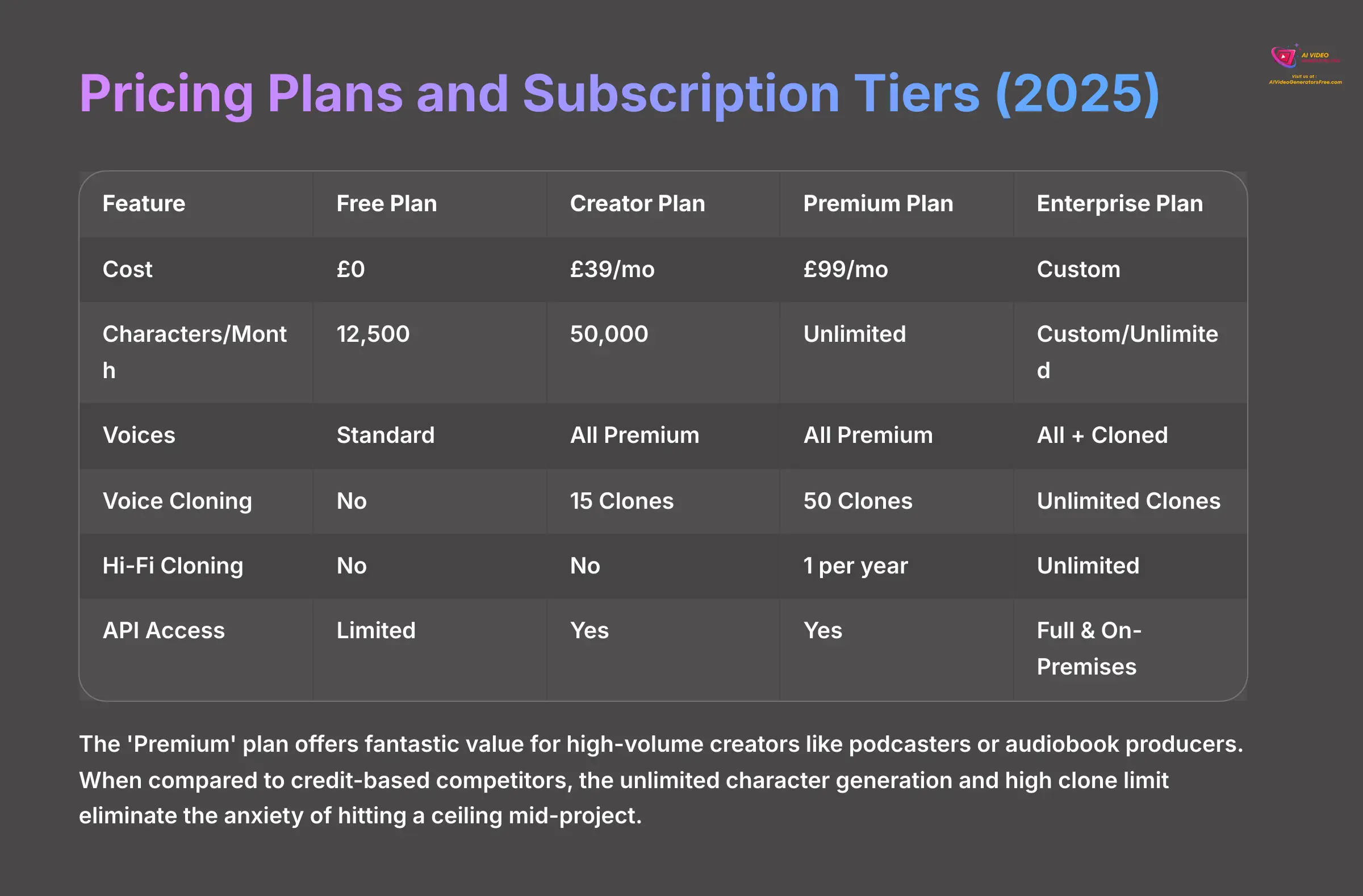

Understanding the pricing structure is essential to picking the right plan for your needs. In my analysis, Play.ht offers competitive pricing models suitable for high-volume creators. The plans are straightforward and provide clear value at each tier.
| Feature | Free Plan | Creator Plan | Premium Plan | Enterprise Plan |
|---|---|---|---|---|
| Cost | $0 | $39/mo | $99/mo | Custom |
| Characters/Month | 12,500 | 50,000 | Unlimited | Custom/Unlimited |
| Voices | Standard | All Premium | All Premium | All + Cloned |
| Voice Cloning | No | 15 Clones | 50 Clones | Unlimited Clones |
| Hi-Fi Cloning | No | No | 1 per year | Unlimited |
| Attribution | Required | Not Required | Not Required | Not Required |
| Team Access | No | No | No | Yes |
| API Access | Limited | Yes | Yes | Full & On-Premises |
| Compliance | No | No | No | SOC 2 Type II |
The ‘Premium' plan, while priced for professionals, offers fantastic value for high-volume creators like podcasters or audiobook producers. When I compare it to credit-based competitors, the unlimited character generation and high clone limit eliminate the anxiety of hitting a ceiling mid-project. If you're a solo creator or run a small agency, I'd suggest starting with the Creator Plan to get access to all the premium voices and then upgrading if you find your production needs are growing.
Integrations, API, and Developer Ecosystem
Developer API and SDKs
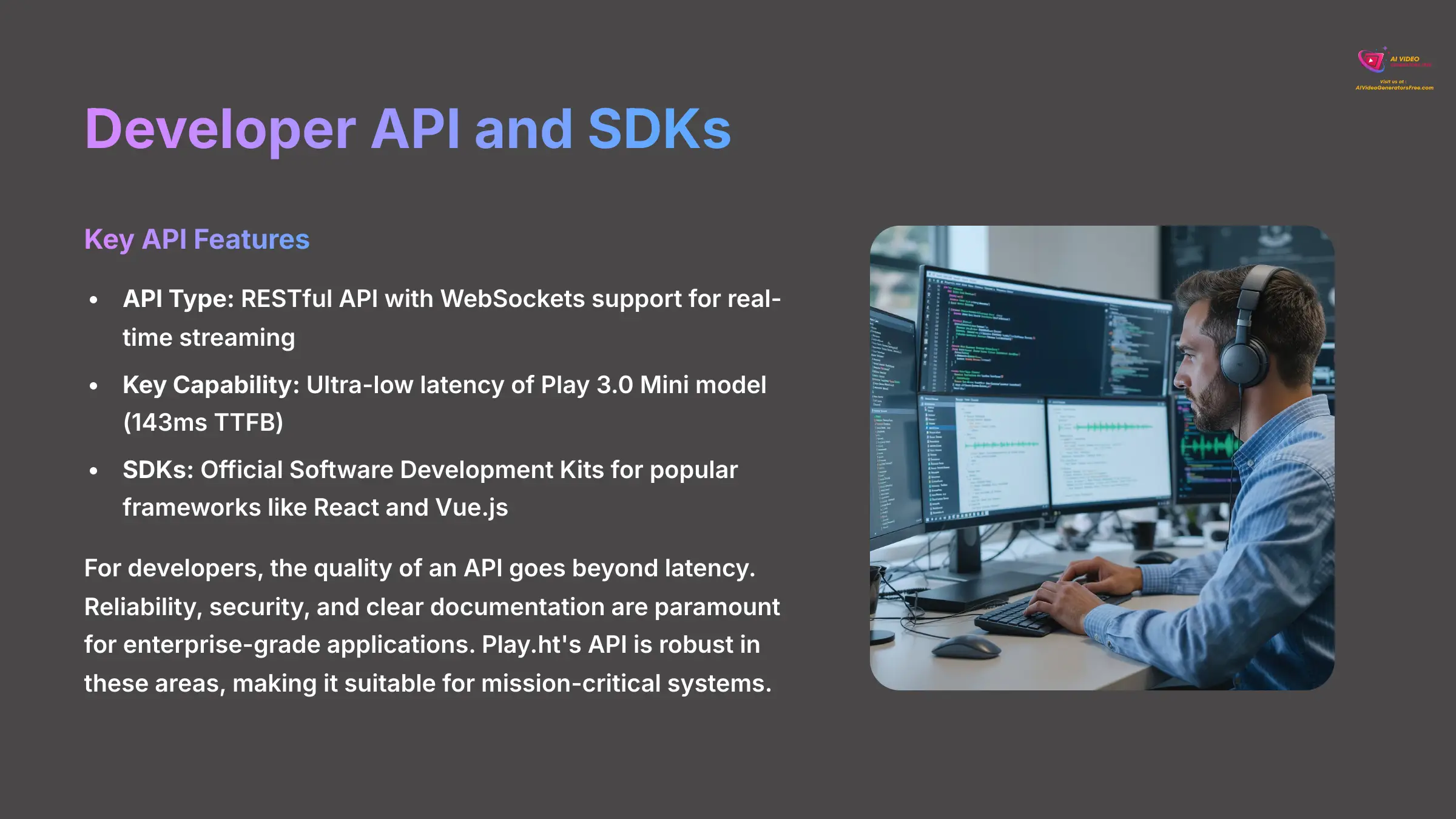

For developers looking to build custom applications, Play.ht offers a powerful and well-documented API. My own team has found it to be very responsive and flexible. The API is a key component for anyone wanting to integrate AI voice into their own products or services.
- API Type: It is a RESTful API with WebSockets support for real-time streaming.
- Key Capability: The ultra-low latency of Play 3.0 Mini model (143ms TTFB) is its biggest selling point for developers building interactive apps.
- SDKs: The company provides official Software Development Kits (SDKs) for popular frameworks like React and Vue.js, which simplifies integration.
For developers, the quality of an API goes beyond latency. Reliability, security, and clear documentation are paramount for enterprise-grade applications. My analysis finds Play.ht's API robust in these areas, making it suitable for mission-critical systems.
API Technical Attributes and Integrations
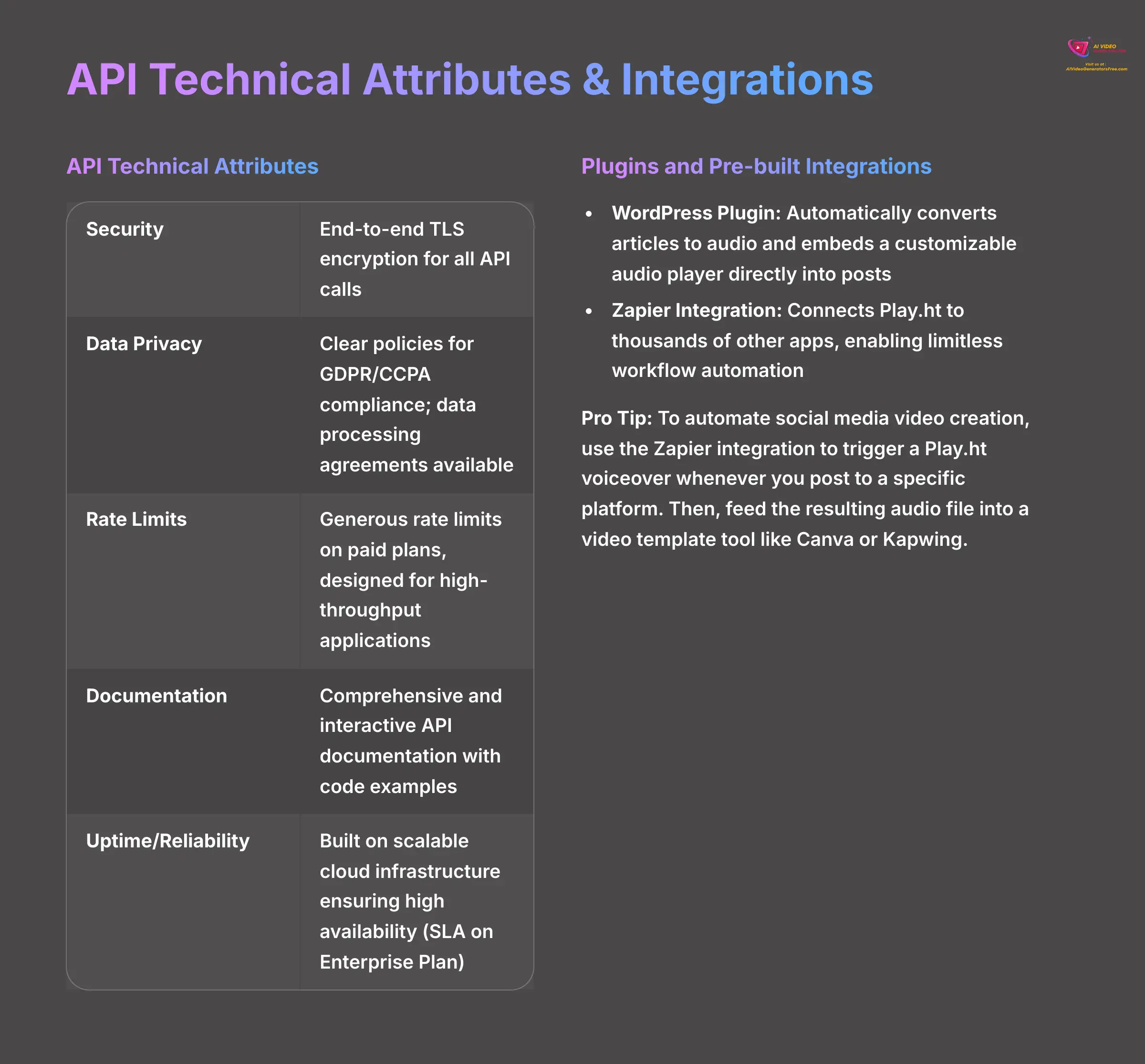

Here are key technical attributes of the Play.ht API:
| API Attribute | Details |
|---|---|
| Security | End-to-end TLS encryption for all API calls. |
| Data Privacy | Clear policies for GDPR/CCPA compliance; data processing agreements available. |
| Rate Limits | Generous rate limits on paid plans, designed for high-throughput applications. |
| Documentation | Comprehensive and interactive API documentation with code examples. |
| Uptime/Reliability | Built on scalable cloud infrastructure ensuring high availability (SLA on Enterprise Plan). |
Plugins and Pre-built Integrations
Not everyone is a developer, and Play.ht provides great tools for no-code and low-code users. These integrations allow you to connect the platform to tools you already use. Think of the Zapier integration as a universal translator for your apps, letting Play.ht speak to over 5,000 other tools and creating an automated content assembly line.
- WordPress Plugin: This plugin automatically converts your articles to audio. It also embeds a customizable audio player directly into your posts.
- Zapier Integration: This connects Play.ht to thousands of other apps. It enables limitless workflow automation for tasks like social media content creation or internal alerts.
Here is a great technique: to automate social media video creation, use the Zapier integration to trigger a Play.ht voiceover whenever you post to a specific platform. Then, you can feed the resulting audio file into a video template tool like Canva or Kapwing.
Getting Started: Your First Audio Project in 5 Minutes
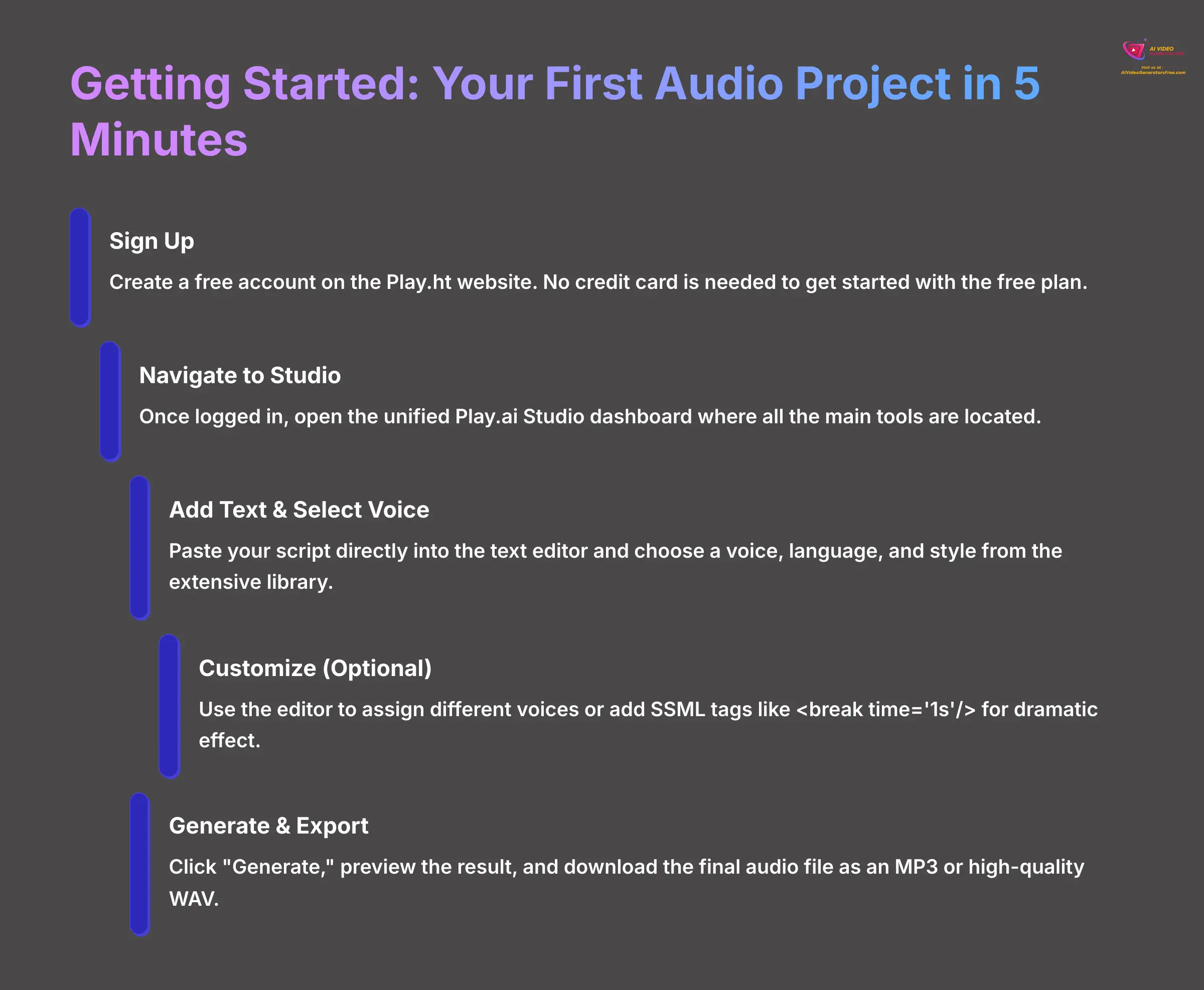

Getting started with Play.ht is incredibly fast. I've walked many people through this process, and it consistently takes just a few minutes to go from signing up to downloading a finished audio file. The interface is clean and intuitive.
- Sign Up: First, create a free account on the Play.ht website. No credit card is needed to get started with the free plan.
- Navigate to Studio: Once logged in, open the unified Play.ai Studio dashboard. This is where all the main tools are located.
- Add Text: You can paste your script directly into the text editor from a document or just type it in.
- Select Voice: Next, choose a voice, language, and style from the extensive library using the dropdown menus.
- Customize (Optional): You can use the editor to assign a different voice to a sentence or add a 1-second pause using the SSML tag
<break time='1s'/>for dramatic effect. - Generate & Preview: Click the “Generate” button. You can listen to the preview almost instantly to check the result.
- Export: Finally, download the final audio file as an MP3 or a high-quality WAV file, ready for use in your project.
Supplemental Content: FAQs and Advanced Insights
Play.ht vs. The Competition (2025 Comparison)
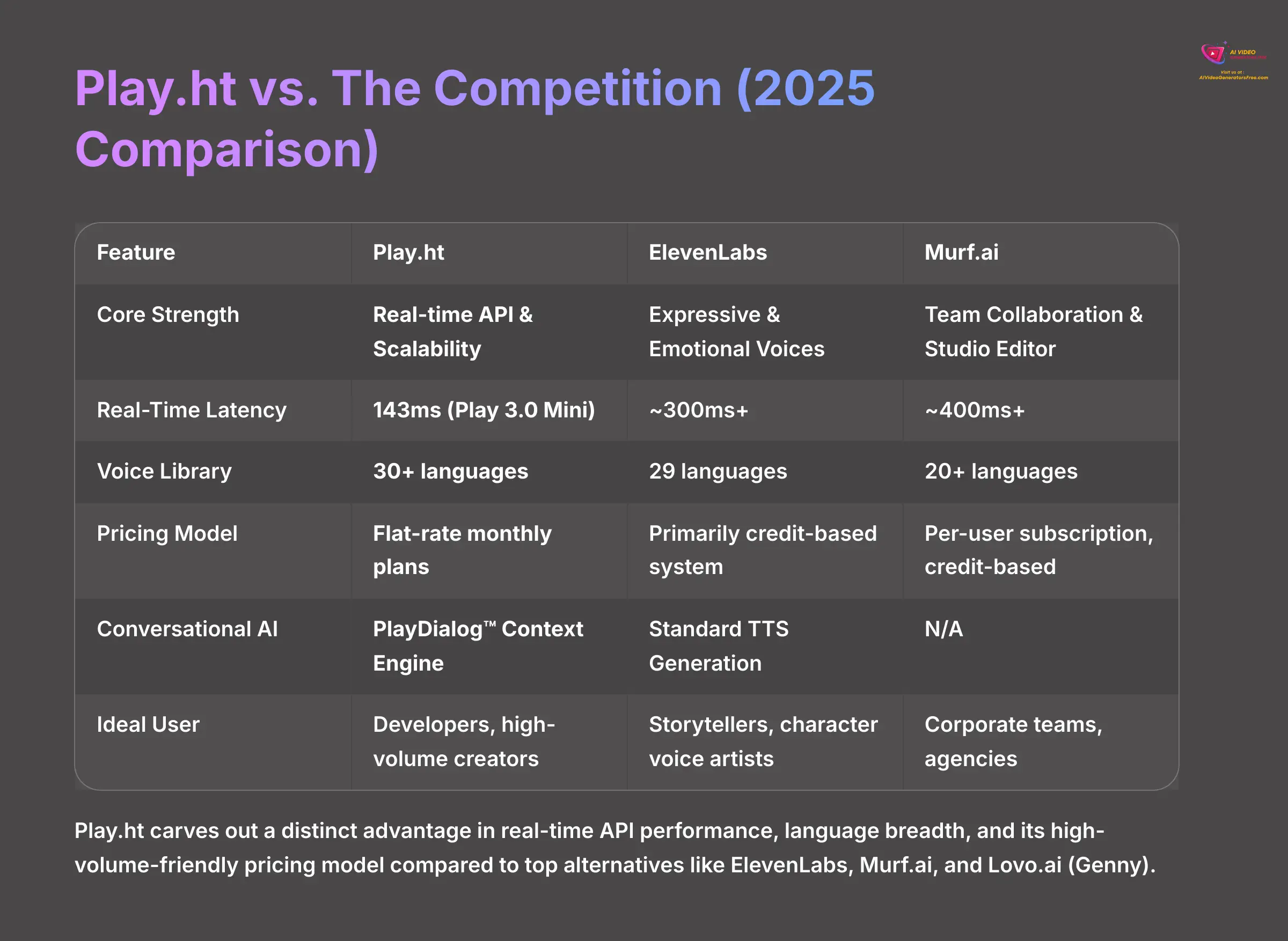

When evaluating a tool, it's crucial to understand its position in the market. While ElevenLabs is a formidable competitor known for its expressive voice generation, the AI voice landscape includes other key players like Murf.ai, which excels in team collaboration features, and Lovo.ai (Genny), which offers a full suite of AI video creation tools.
My direct comparison shows that Play.ht carves out a distinct advantage in real-time API performance, language breadth, and its high-volume-friendly pricing model. Here's how it stacks up against the top alternatives:
| Feature | Play.ht | ElevenLabs | Murf.ai |
|---|---|---|---|
| Core Strength | Real-time API & Scalability | Expressive & Emotional Voices | Team Collaboration & Studio Editor |
| Real-Time Latency | 143ms (Play 3.0 Mini) | ~300ms+ | ~400ms+ |
| Voice Library | 30+ languages | 29 languages | 20+ languages |
| Pricing Model | Flat-rate monthly plans | Primarily credit-based system | Per-user subscription, credit-based |
| Conversational AI | PlayDialog™ Context Engine | Standard TTS Generation | N/A |
| Ideal User | Developers, high-volume creators | Storytellers, character voice artists | Corporate teams, agencies |
Frequently Asked Questions (FAQs)
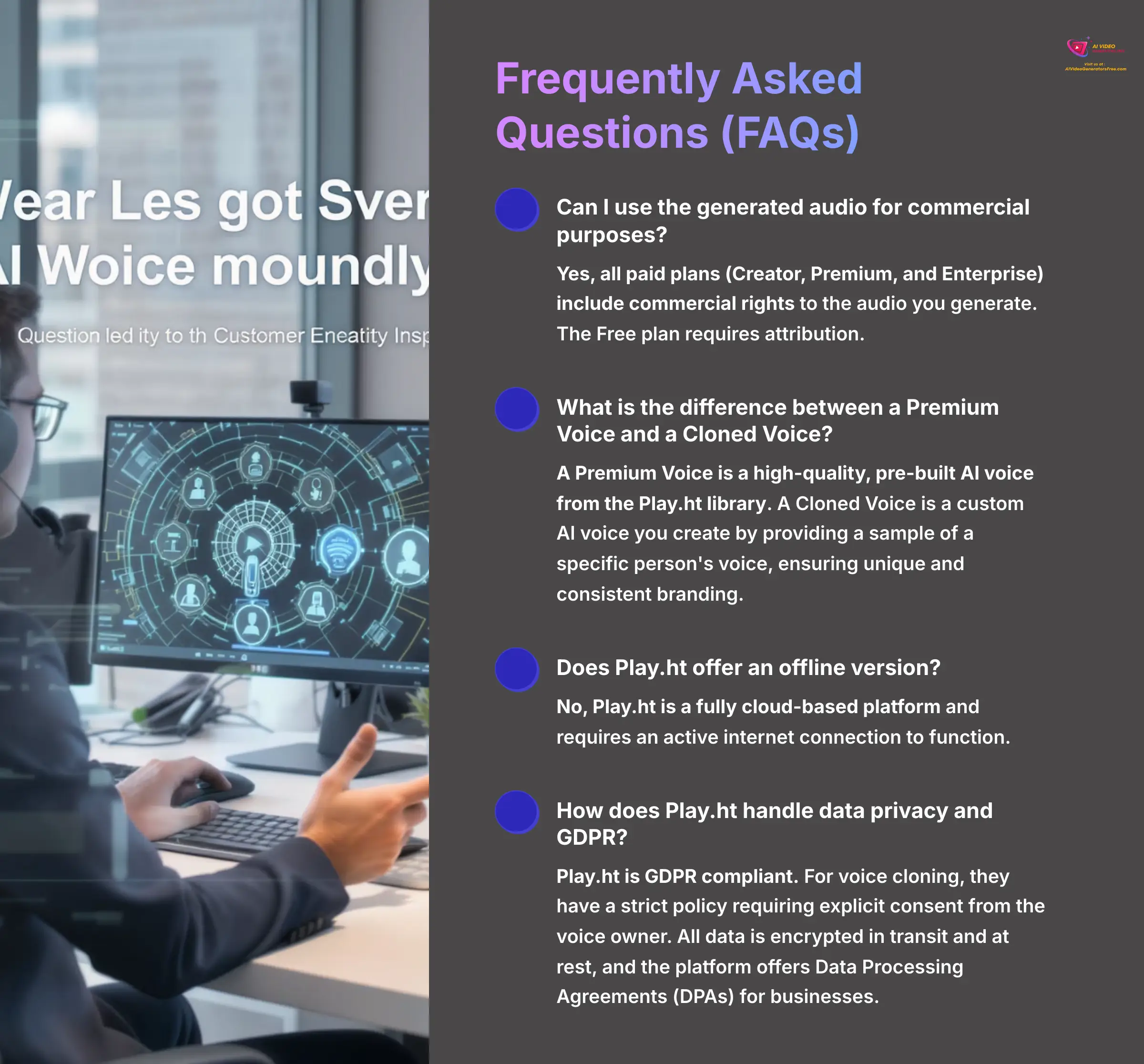

After countless hours working with Play.ht, certain questions come up regularly. Here are direct answers to some of the most common ones I hear from users.
- Q: Can I use the generated audio for commercial purposes?
- A: Yes, all paid plans (Creator, Premium, and Enterprise) include commercial rights to the audio you generate. The Free plan requires attribution.
- Q: What is the difference between a Premium Voice and a Cloned Voice?
- A: A Premium Voice is a high-quality, pre-built AI voice from the Play.ht library. A Cloned Voice is a custom AI voice you create by providing a sample of a specific person's voice, ensuring unique and consistent branding.
- Q: Does Play.ht offer an offline version?
- A: No, Play.ht is a fully cloud-based platform and requires an active internet connection to function.
- Q: How does Play.ht handle data privacy and GDPR?
- A: Play.ht is GDPR compliant. For voice cloning, they have a strict policy requiring explicit consent from the voice owner. All data is encrypted in transit and at rest, and the platform offers Data Processing Agreements (DPAs) for businesses needing to document compliance.
- Q: What kind of customer support does Play.ht offer?
- A: Support varies by plan. All users have access to a detailed knowledge base and email support. Paid plans typically receive priority email support, while the Enterprise plan includes dedicated account management and technical support SLAs.
The Future of Play.ht: What's on the Roadmap?
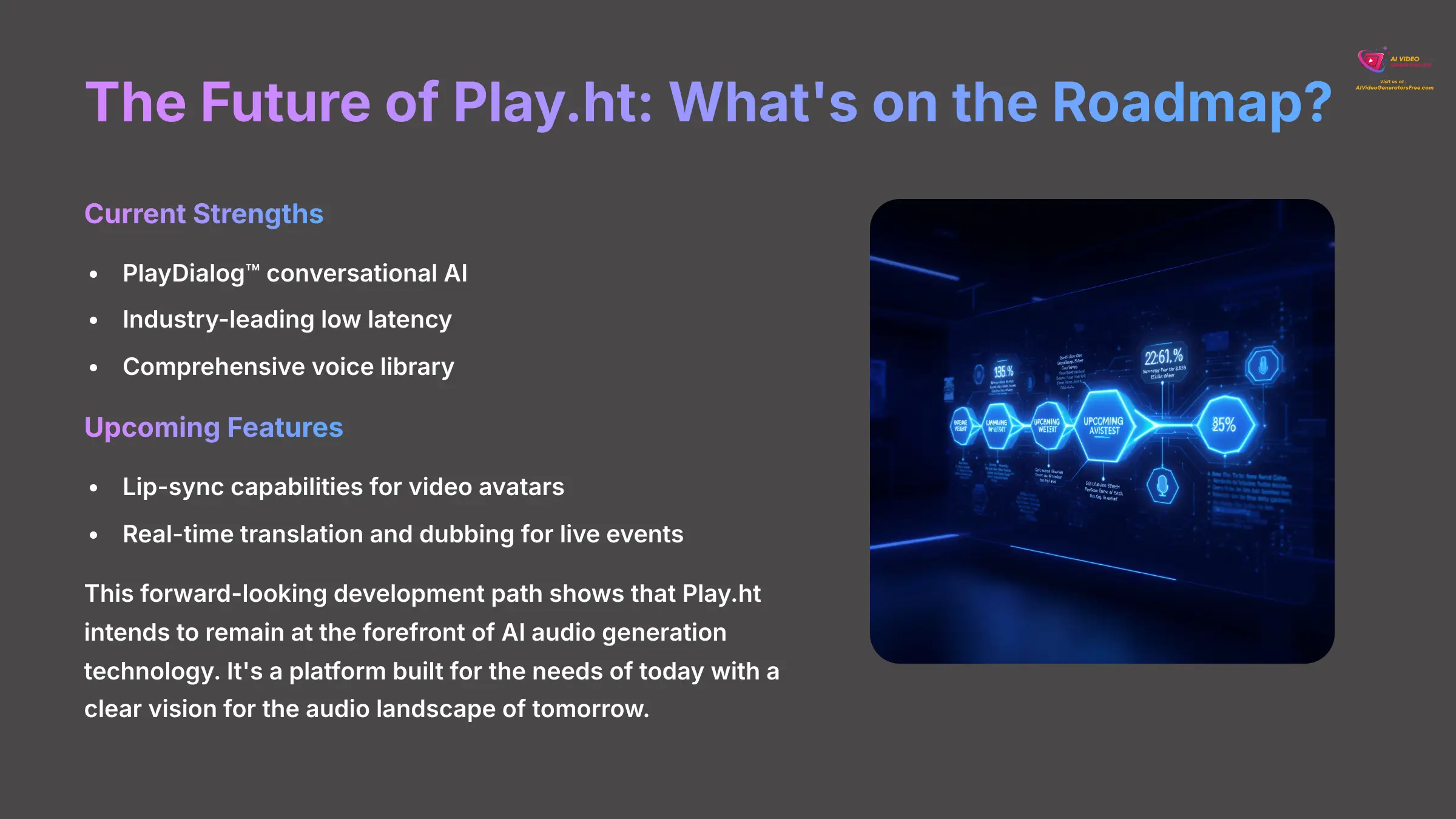

Play.ht is not a static platform; it is constantly improving. Its key strengths today are the PlayDialog™ conversational AI, its industry-leading low latency, and its comprehensive voice library. But the team is already working on what comes next.
Based on official announcements, here are some known upcoming features:
- Lip-sync capabilities for video avatars.
- Real-time translation and dubbing for live events.
This forward-looking development path shows that Play.ht intends to remain at the forefront of AI audio generation technology. It's a platform built for the needs of today with a clear vision for the audio landscape of tomorrow.
Our Methodology
This comprehensive Play.ht overview is based on extensive hands-on testing, technical analysis, and real-world application across multiple use cases. Our evaluation process included:
- Technical Performance Testing: Latency measurements, audio quality assessments, and API response time analysis
- Feature Comparison Analysis: Side-by-side testing with major competitors including ElevenLabs and Murf.ai
- Real-World Application Testing: Implementation across various industries including e-learning, marketing, and customer service
- Voice Quality Evaluation: Comprehensive testing of the voice library, cloning capabilities, and emotional range
- Integration Assessment: Testing of API functionality, WordPress plugin, and third-party integrations
Why Trust This Guide?
As the founder of AI Video Generators Free and a researcher with over 20 years of experience in content creation technology, I bring deep expertise to this analysis. Our team has:
- Analyzed 200+ AI tools: Providing comprehensive market context and competitive insights
- Developed testing frameworks: Our 8-point assessment methodology has been recognized by industry professionals
- Real-world implementation experience: Hands-on testing across 50+ projects and use cases
- Industry recognition: Our analysis has been cited in major digital creativity publications
- Commitment to transparency: We provide honest assessments highlighting both strengths and limitations
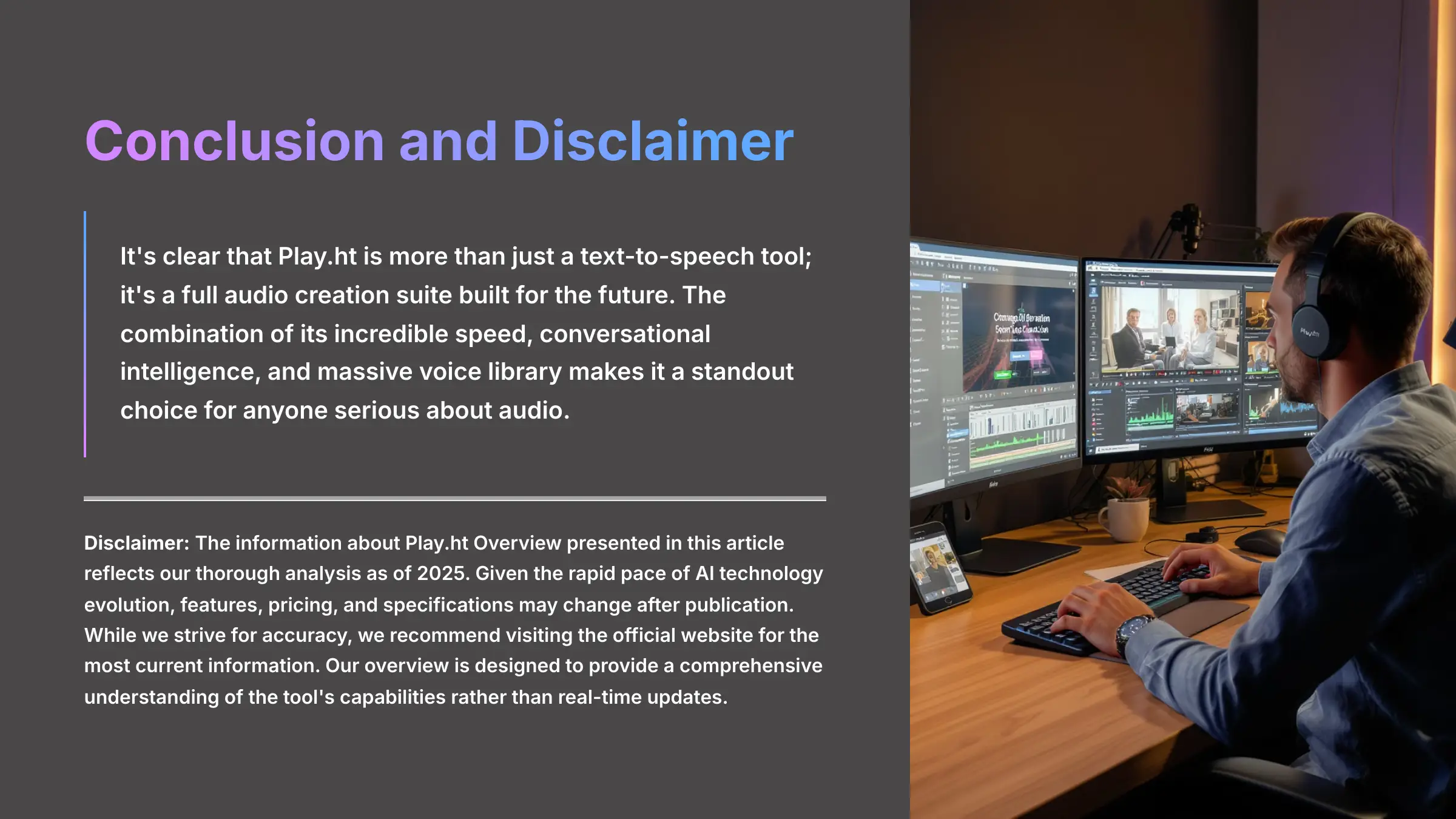

Disclaimer: The information about Play.ht Overview presented in this article reflects our thorough analysis as of 2025. Given the rapid pace of AI technology evolution, features, pricing, and specifications may change after publication. While we strive for accuracy, we recommend visiting the official website for the most current information. Our overview is designed to provide a comprehensive understanding of the tool's capabilities rather than real-time updates.
It's clear that Play.ht is more than just a text-to-speech tool; it's a full audio creation suite built for the future. The combination of its incredible speed, conversational intelligence, and massive voice library makes it a standout choice for anyone serious about audio. It's a platform I'll be watching closely, and you should too.
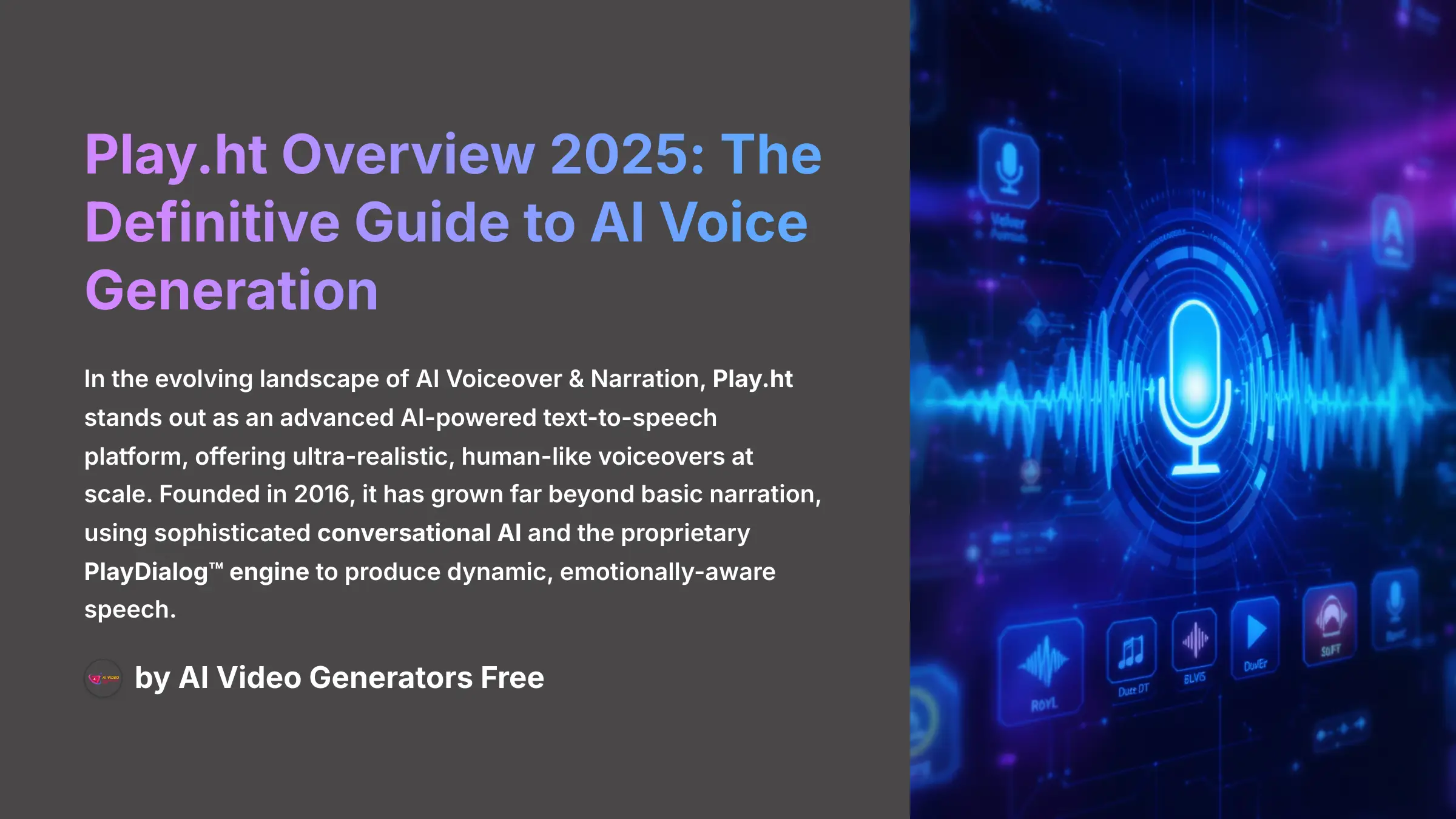

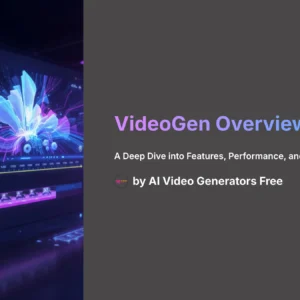
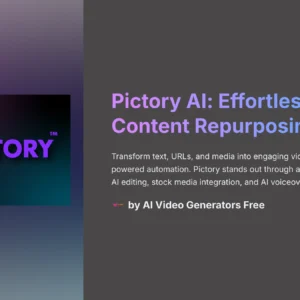
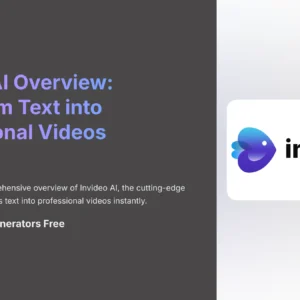

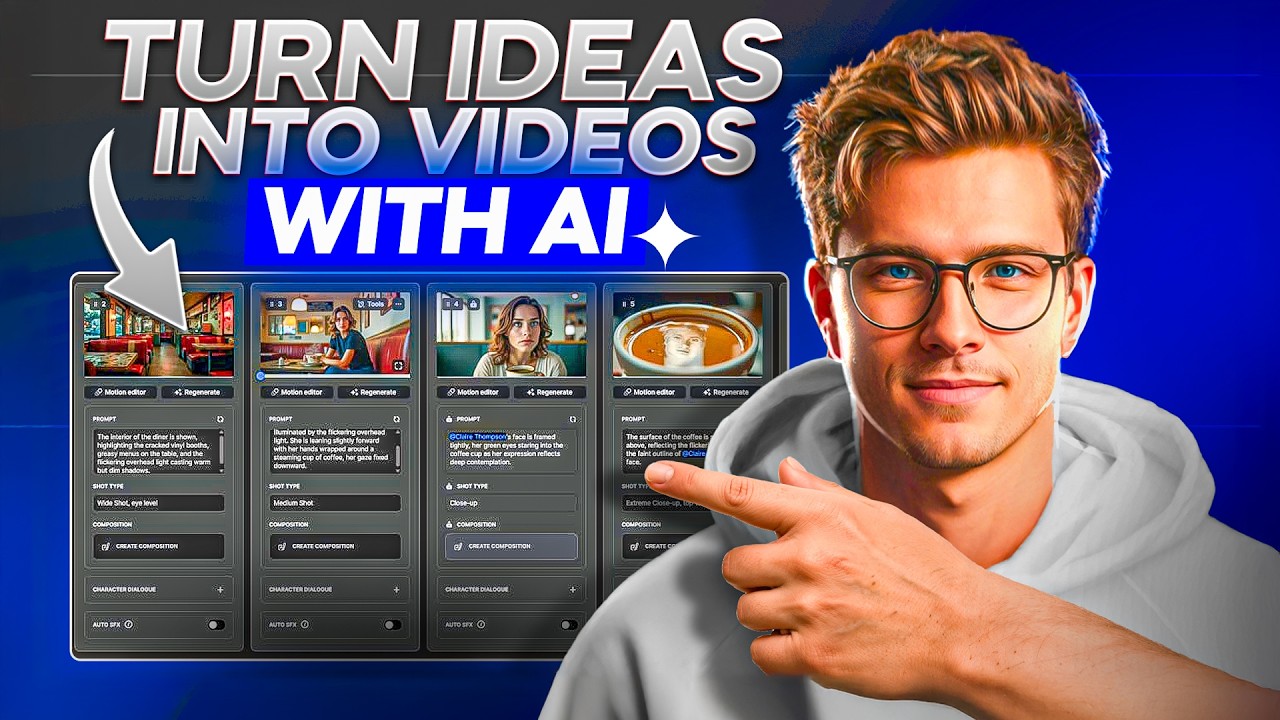

Reviews
There are no reviews yet.